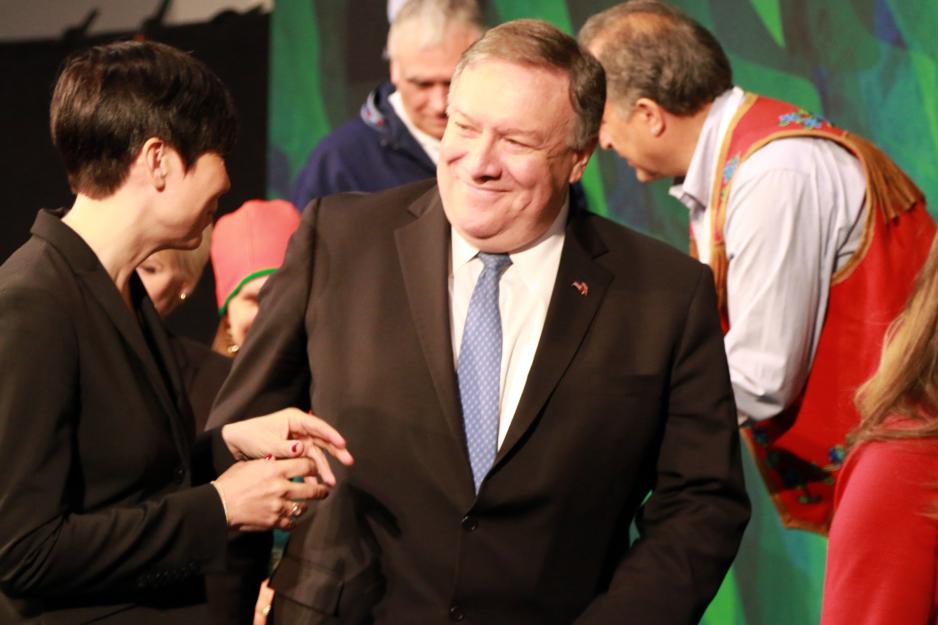Peace and Love, My Ass

Dialogue and cooperation in the Arctic continues despite the Crimea, despite Syria, despite trade wars, despite accelerating arms race, and despite what some describe as a situation between the East and the West that most of all resembles a cold war, our Editor-in-Chief Arne O. Holm writes. The picture shows Norwegian Minister of Foreign Affairs Ine Eriksen Søreide and her American counterpart Mike Pompeo during the Arctic Council Ministerial Meeting in Rovaniemi, Finland last week.
When an American foreign minister resorts to war rhetoric, are the rest of us to continue clinging to the Arctic and the High North being an "arena for peace and cooperation"? And can we still speak of the Arctic as a "territory of dialogue" when the USA chooses monologue over dialogue?
For many years now, I have been sitting by the desk of Arctic state leaders. Almost every speech or lecture have included a description of the Arctic as an arena for peace and stability.
Incantations
The incantations, sweet and promising as they might be, in addition to making sense, to being rational, are gently massaged into the thoughts and mind of those of us who are genuinely concerned with what goes on in the High North.
I have used the very same phrases in talks, debates, commentaries.
I have even, with some sort of pride, argued that conflicts elsewhere in the world do not affect the good cooperation of the High North.
Dialogue and cooperation in the Arctic continues despite the Crimea, despite Syria, despite trade wars, despite accelerating arms race, and despite what some describe as a situation between the East and the West that most of all resembles a cold war.
International researchers and thinktanks in particular spend a lot of time stressing the special status of the High North in a troubled world. The overall analysis says that only a spillover effect from other places may threaten the Arctic peace project.
Words without meaning
After being present when US Secretary of State Mike Pompeo last week lashed out from the podium in Rovaniemi, I feel that these words of praise by and large have lost their significance.
Pompeo gave his increasingly infamous speech in connection with the Arctic Council Ministerial Meeting in Finland.
His contribution was, to put it simply, to push security policy issues onto the agenda of the cooperation organization of eight Arctic states.
He did so knowingly, and in clear violation of the Council’s declared goal of keeping security policy issues off the Council's agenda. He first attacked China, which he accused of having military ambitions in the Arctic, then lashed out against Russia, one of the Arctic Council members, in no uncertain terms.
American appetite
The following day, Mike Pompeo refused to acknowledge the climate crisis and its ensuing brutal consequences for the people living in the Arctic. The result was that for the first time ever in history, the Arctic Council failed to reach a joint declaration and thus has no clear goal or declaration for its further work.
Melting sea ice increases the American appetite for the resources found in the High North. The climate crisis becomes the solution, not a problem.
The American rhetoric is also about securing territorial rights. Based on this analysis, the USA will intensify its presence in the Arctic. Not just in the form of exploiting resources, but also militarily.
One may, of course, discuss whether this is a spillover effect from the American conflict with China and Russia elsewhere in the world, or whether it is the US’ understanding of the situation in the Arctic alone that is about to change the rules of the game in the High North. One may argue along both dimensions.
Challenging for Norway
The situation is challenging for Norway too. Quite in contrast to the American message, both PM Erna Solberg and Foreign Minister Ine Eriksen Søreide attended a dialogue conference in St. Petersburg a few weeks ago. In meetings with Vladimir Putin and Sergey Lavrov, respectively, both emphasized dialogue and cooperation as an advantage for Arctic states. The Norwegian position will in the future be continually balanced up against the interest of our key ally, the USA.
The fact that all eight foreign ministers from the eight Arctic states attended the Arctic Council Ministerial Meeting also goes a long way in saying something.
There is nothing that goes to indicate that the conflict currently playing out on an open stage is a pre-stage to military conflict in the Arctic, though war rhetoric features prominently. None of the parties have any interest in that.
Sand box digging
There is a wide span between peace and cooperation on the one side and military confrontation on the other.
What happens now, is that dialogue is replaced by threats and the use of force.
So I will probably go looking for the nearest coffee machine next time an Arctic head of state repeats the incantations about cooperation and dialogue from the time preceding Rovaniemi.
If these terms are to carry any future validity, someone will first have to dig Mike Pompeo out from the sand box in which he has placed himself.
This commentary originally appeared in Norwegian and has been translated by HNN's Elisabeth Bergquist.

